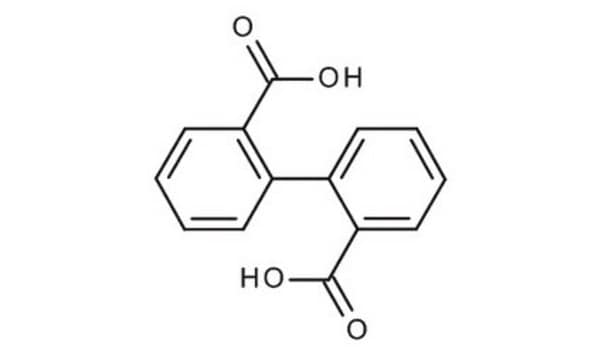517763
2,2′-Bipyridine-5,5′-dicarboxylic acid
97%
Synonym(s):
6,6′-Binicotinic acid
About This Item
Recommended Products
Assay
97%
mp
>360 °C (lit.)
SMILES string
OC(=O)c1ccc(nc1)-c2ccc(cn2)C(O)=O
InChI
1S/C12H8N2O4/c15-11(16)7-1-3-9(13-5-7)10-4-2-8(6-14-10)12(17)18/h1-6H,(H,15,16)(H,17,18)
InChI key
KVQMUHHSWICEIH-UHFFFAOYSA-N
Looking for similar products? Visit Product Comparison Guide
General description
Application
- Zn-MOFs Containing Pyridine and Bipyridine Carboxylate Organic Linkers and Open Zn2+ Sites: This study discusses the synthesis and characterization of Zinc-based Metal-Organic Frameworks (MOFs) utilizing 2,2′-Bipyridine-5,5′-dicarboxylic acid as a linker, showing potential applications in gas storage and separation (J Kim et al., 2015).
- Ethylene oligomerization in metal organic frameworks bearing nickel (ii) 2, 2′-bipyridine complexes: Reports the use of 2,2′-Bipyridine-5,5′-dicarboxylic acid in Nickel-based MOFs for catalyzing ethylene oligomerization, highlighting the versatility of MOFs in catalysis (MI Gonzalez et al., 2017).
- Two 3-D metal organic frameworks containing 2, 2′-bipyridine-5, 5′-dicarboxylic acid: synthesis, structure, and magnetic properties: Discusses the synthesis and magnetic properties of two 3-D MOFs built with 2,2′-Bipyridine-5,5′-dicarboxylic acid, demonstrating potential for advanced material applications (M Fang et al., 2014).
Signal Word
Warning
Hazard Statements
Precautionary Statements
Hazard Classifications
Eye Irrit. 2 - Skin Irrit. 2 - STOT SE 3
Target Organs
Respiratory system
Storage Class Code
11 - Combustible Solids
WGK
WGK 3
Flash Point(F)
Not applicable
Flash Point(C)
Not applicable
Personal Protective Equipment
Certificates of Analysis (COA)
Search for Certificates of Analysis (COA) by entering the products Lot/Batch Number. Lot and Batch Numbers can be found on a product’s label following the words ‘Lot’ or ‘Batch’.
Already Own This Product?
Find documentation for the products that you have recently purchased in the Document Library.
Customers Also Viewed
Our team of scientists has experience in all areas of research including Life Science, Material Science, Chemical Synthesis, Chromatography, Analytical and many others.
Contact Technical Service








![1,4-Diazabicyclo[2.2.2]octane ReagentPlus®, ≥99%](/deepweb/assets/sigmaaldrich/product/structures/366/129/a6ff4175-974d-4fac-9038-b35e508ef252/640/a6ff4175-974d-4fac-9038-b35e508ef252.png)



